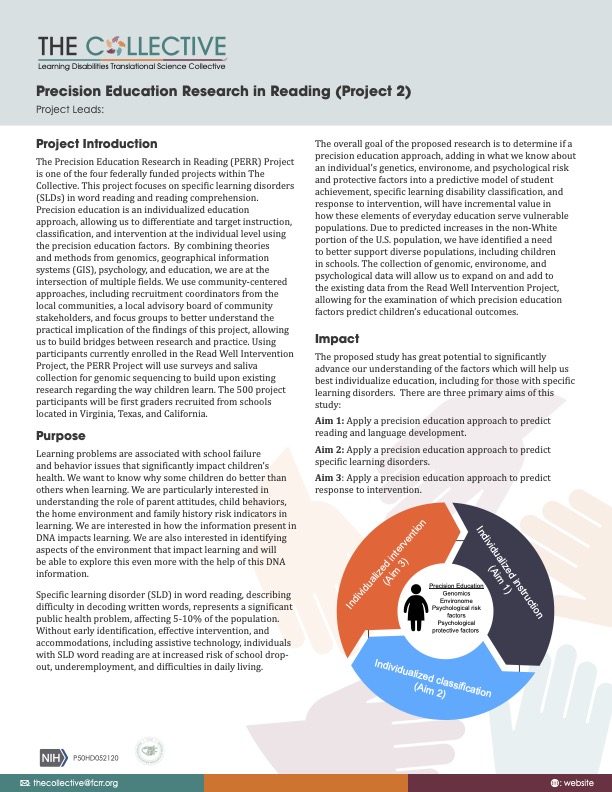
Project Introduction
The Precision Education Research in Reading (PERR) Project is one of the four federally funded projects within The Collective. This project focuses on specific learning disorders (SLDs) in word reading and reading comprehension. Precision education is an individualized education approach, allowing us to differentiate and target instruction, classification, and intervention at the individual level using the precision education factors. By combining theories and methods from genomics, geographical information systems (GIS), psychology, and education, we are at the intersection of multiple fields. We use community-centered approaches, including recruitment coordinators from the local communities, a local advisory board of community stakeholders, and focus groups to better understand the practical implication of the findings of this project, allowing us to build bridges between research and practice. Using participants currently enrolled in the Read Well Intervention Project, the PERR Project will use surveys and saliva collection for genomic sequencing to build upon existing research regarding the way children learn. The 500 project participants will be first graders recruited from schools located in Virginia, Texas, and California.
Purpose
Learning problems are associated with school failure and behavior issues that significantly impact children’s health. We want to know why some children do better than others when learning. We are particularly interested in understanding the role of parent attitudes, child behaviors, the home environment and family history risk indicators in learning. We are interested in how the information present in DNA impacts learning. We are also interested in identifying aspects of the environment that impact learning and will be able to explore this even more with the help of this DNA information.
Specific learning disorder (SLD) in word reading, describing difficulty in decoding written words, represents a significant public health problem, affecting 5-10% of the population. Without early identification, effective intervention, and accommodations, including assistive technology, individuals with SLD word reading are at increased risk of school dropout, underemployment, and difficulties in daily living.
The overall goal of the proposed research is to determine if a precision education approach, adding in what we know about an individual’s genetics, environome, and psychological risk and protective factors into a predictive model of student achievement, specific learning disability classification, and response to intervention, will have incremental value in how these elements of everyday education serve vulnerable populations. Due to predicted increases in the non-White portion of the U.S. population, we have identified a need to better support diverse populations, including children in schools. The collection of genomic, environome, and psychological data will allow us to expand on and add to the existing data from the Read Well Intervention Project, allowing for the examination of which precision education factors predict children’s educational outcomes.
Impact
The proposed study has great potential to significantly advance our understanding of the factors which will help us best individualize education, including for those with specific learning disorders. There are three primary aims of this study:
Aim 1
Apply a precision education approach to predict reading and language development.
Aim 2
Apply a precision education approach to predict specific learning disorders.
Aim 3
Apply a precision education approach to predict response to intervention.


